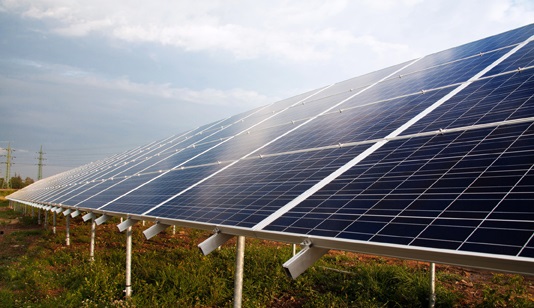Massader – tapping into the sun‘s source
A new addition to Palestine Investment Fund’s portfolio of businesses aims to harness the power of the sun
Committed to energy and water security for Palestine
Global warming has forced many countries across the planet to look again at how their natural resources are used. It also means that countries that rely on others for their energy or water are looking at new options in what is an uncertain future.
With this in mind, at the end of 2015, Palestine Investment Fund (PIF) established a new company: Massader Company for the Development of Natural Resources and Infrastructure Projects.
As part of an ambitious strategy, Massader will invest in solar energy. This is an important step in the quest for energy security for Palestine. Utilising renewable resources and establishing infrastructure will serve the nation’s needs.
Massader has announced that it will focus initially on creating a solar energy programme to enable different sectors in Palestine to own solar energy systems for their own consumption, thereby reducing their electricity bills.
Noor Palestine Solar Programme
Massader aims to encourage the production of clean electric energy from renewable sources through small producers (the domestic sector, business and small enterprises sector, and the public sector). The project will use rooftops to establish systems for producing energy from solar photovoltaic (PV) panels. Also, this programme will work to build clusters of small solar energy fields to serve customers in the business and SME sector, with the aim of creating an installed capacity of 35 Megawatts (MW), with an estimated investment of $50 million.
How will the Noor Palestine Solar Programme work?
This programme will mobilise funds to develop solar PV parks and rooftop solar systems with different capacities and hand them over to end-users through green loans from local financial institutions. The philosophy of the programme is to remove the difficulties, uncertainties and investment risks associated with developing solar PV systems, and the associated fund mobilisation that facilitates the lending process for end-users to acquire those PV systems after they become operational.
Solar parks
The aim is to initially build three medium-scale solar parks across the country, with each one projected to produce 5MW. One solar park would be in the north of the country, with two in central Palestine.
Solar systems on rooftops
The aim is to harvest 5MW from 1500 residential rooftops, 5MW from 100 public building rooftops (schools, ministries, mosques etc), and 10MW from panels placed on business’ rooftops.
Solar Energy Fields Project
This project aims to build a group of medium-to-large size solar energy farms to diversify sources of electricity supply across the country. This bundle of projects will be developed through a competitive bid system or submitting direct offers/bids in several suitable locations for this purpose to the government. Preliminary assessments indicate that the estimated size of investment in this project will reach about $100 million.
Working with partners and consumers
Massader has signed memoranda of understanding (MOU) with Ramallah, Al Bireh, Qalqilya, Jenin and Tubas municipalities to help achieve these plans.
All solar facilities will be owned by customers (end-users) and will be installed by qualified local contractors. The medium-scale solar parks will be jointly owned by a group of customers/investors.
The whole project follows the “net metering” scheme approved by the government. Instead of paying monthly electricity bills to a utility firm, once installed, customers will pay the same amount they used to pay for their electricity bills to repay the initial loan from the bank to purchase the solar system. After the repayment period, the customers will enjoy free electricity generated by their owned solar system.
Massader takes full responsibility for developing high quality, low cost solar systems, incurring all project development costs and risk. After the solar system becomes operational, local financial institutions will be more motivated and less fearful of providing long-term finance for customers.
Objectives of this programme include; increasing power generation independence; reducing the cost of electricity to customers; increasing power supply in Palestine; enhancing renewable energy use; developing local capacity so as to enable communities to develop and construct solar plants. It should also encourage local banks to finance solar projects by minimizing the associated uncertainties, hence converting the financing of solar energy projects from high risk project financing into operational asset financing with minimal uncertainties.
Noor Palestine
Noor Palestine is an integral part of a national level strategy to achieve energy security for Palestine. This strategy includes generating electricity from hydrocarbon resources – in this case, natural gas. Palestine celebrated the laying of Jenin Power Plant’s (JPP) cornerstone, as it marked a new beginning. JPP is the first power generating plant in the West Bank, and constitutes the largest investment in infrastructure with an estimated investment of more than $600 million. It is located in the Jenin governorate and its expected capacity is 450MW which will provide 40% of Palestine’s current needs (50% of the West Bank’s needs) in electricity. The JPP will be implemented through the Palestinian Power Generation Company, which is a consortium of Palestinian investors (PIF is the largest shareholder at 39.6% of shares). Other shareholders include leading Palestinian private sector players such as PADICO, PalTel, Bank of Palestine, APIC and regional banks such as Arab Bank, Cairo Amman Bank and others.
Dr. Mohammad Mustafa, Chairman of the Board of PIF, said; “With such projects, investment risk, lack of financing and the limited incentives are the main challenges that renewable energy faces in Palestine.
If we add the challenges caused by the Israeli occupation that result in obstructing Palestinian economic independence, the added value of the renewable energy programme, Noor Palestine, becomes even more relevant and urgent.“Whilst we realise that solar energy is not the full answer to combatting climate change, we feel it is a very essential part of it. Therefore, it is crucial that the Palestinian private sector, and potentially international investors, take a leading role in empowering the government so that it can achieve its national strategies in this vital sector. PIF’s strategy is built on developing an integral package of projects that starts with developing Palestine’s natural resources and providing the infrastructure necessary to producing electricity from both traditional and renewable resources, promoting investment in the high voltage transmission network, and expanding the capacity of the low voltage transmission network.”
About Palestine Investment Fund
Palestine Investment Fund (PIF) is the national sovereign fund of the State of Palestine and strives to develop the country’s national assets and resources for the purpose of achieving national economic empowerment guided by a vision and a work philosophy, premised on the best values and business practice. Established in 2003 as an independent public limited company, Palestine Investment Fund’s mission is to contribute to the building of a strong, independent and vibrant national economy as one of the pillars of the future Palestinian state. It promotes its ability to attract investments and aims to empower the Palestinian private sector.
The Palestine Investment Fund aims to achieve its tasks by making strategic investments in feasible and socially-responsible development projects, capable of creating jobs and consolidating sustainable growth in strategic and vital national sectors.
For more information about PIF or Massader, contact www.pif.ps




























